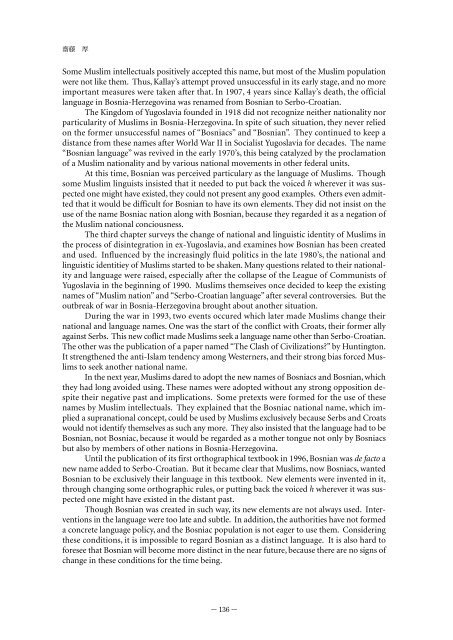a-saito
a-saito
a-saito
Create successful ePaper yourself
Turn your PDF publications into a flip-book with our unique Google optimized e-Paper software.
Some Muslim intellectuals positively accepted this name, but most of the Muslim population<br />
were not like them. Thus, Kallay’s attempt proved unsuccessful in its early stage, and no more<br />
important measures were taken after that. In 1907, 4 years since Kallay’s death, the official<br />
language in Bosnia-Herzegovina was renamed from Bosnian to Serbo-Croatian.<br />
The Kingdom of Yugoslavia founded in 1918 did not recognize neither nationality nor<br />
particularity of Muslims in Bosnia-Herzegovina. In spite of such situation, they never relied<br />
on the former unsuccessful names of “Bosniacs” and “Bosnian”. They continued to keep a<br />
distance from these names after World War II in Socialist Yugoslavia for decades. The name<br />
“Bosnian language” was revived in the early 1970’s, this being catalyzed by the proclamation<br />
of a Muslim nationality and by various national movements in other federal units.<br />
At this time, Bosnian was perceived particulary as the language of Muslims. Though<br />
some Muslim linguists insisted that it needed to put back the voiced h wherever it was suspected<br />
one might have existed, they could not present any good examples. Others even admitted<br />
that it would be difficult for Bosnian to have its own elements. They did not insist on the<br />
use of the name Bosniac nation along with Bosnian, because they regarded it as a negation of<br />
the Muslim national conciousness.<br />
The third chapter surveys the change of national and linguistic identity of Muslims in<br />
the process of disintegration in ex-Yugoslavia, and examines how Bosnian has been created<br />
and used. Influenced by the increasingly fluid politics in the late 1980’s, the national and<br />
linguistic identitiey of Muslims started to be shaken. Many questions related to their nationality<br />
and language were raised, especially after the collapse of the League of Communists of<br />
Yugoslavia in the beginning of 1990. Muslims themseives once decided to keep the existing<br />
names of “Muslim nation” and “Serbo-Croatian language” after several controversies. But the<br />
outbreak of war in Bosnia-Herzegovina brought about another situation.<br />
During the war in 1993, two events occured which later made Muslims change their<br />
national and language names. One was the start of the conflict with Croats, their former ally<br />
against Serbs. This new coflict made Muslims seek a language name other than Serbo-Croatian.<br />
The other was the publication of a paper named “The Clash of Civilizations” by Huntington.<br />
It strengthened the anti-Islam tendency among Westerners, and their strong bias forced Muslims<br />
to seek another national name.<br />
In the next year, Muslims dared to adopt the new names of Bosniacs and Bosnian, which<br />
they had long avoided using. These names were adopted without any strong opposition despite<br />
their negative past and implications. Some pretexts were formed for the use of these<br />
names by Muslim intellectuals. They explained that the Bosniac national name, which implied<br />
a supranational concept, could be used by Muslims exclusively because Serbs and Croats<br />
would not identify themselves as such any more. They also insisted that the language had to be<br />
Bosnian, not Bosniac, because it would be regarded as a mother tongue not only by Bosniacs<br />
but also by members of other nations in Bosnia-Herzegovina.<br />
Until the publication of its first orthographical textbook in 1996, Bosnian was de facto a<br />
new name added to Serbo-Croatian. But it became clear that Muslims, now Bosniacs, wanted<br />
Bosnian to be exclusively their language in this textbook. New elements were invented in it,<br />
through changing some orthographic rules, or putting back the voiced h wherever it was suspected<br />
one might have existed in the distant past.<br />
Though Bosnian was created in such way, its new elements are not always used. Interventions<br />
in the language were too late and subtle. In addition, the authorities have not formed<br />
a concrete language policy, and the Bosniac population is not eager to use them. Considering<br />
these conditions, it is impossible to regard Bosnian as a distinct language. It is also hard to<br />
foresee that Bosnian will become more distinct in the near future, because there are no signs of<br />
change in these conditions for the time being.


